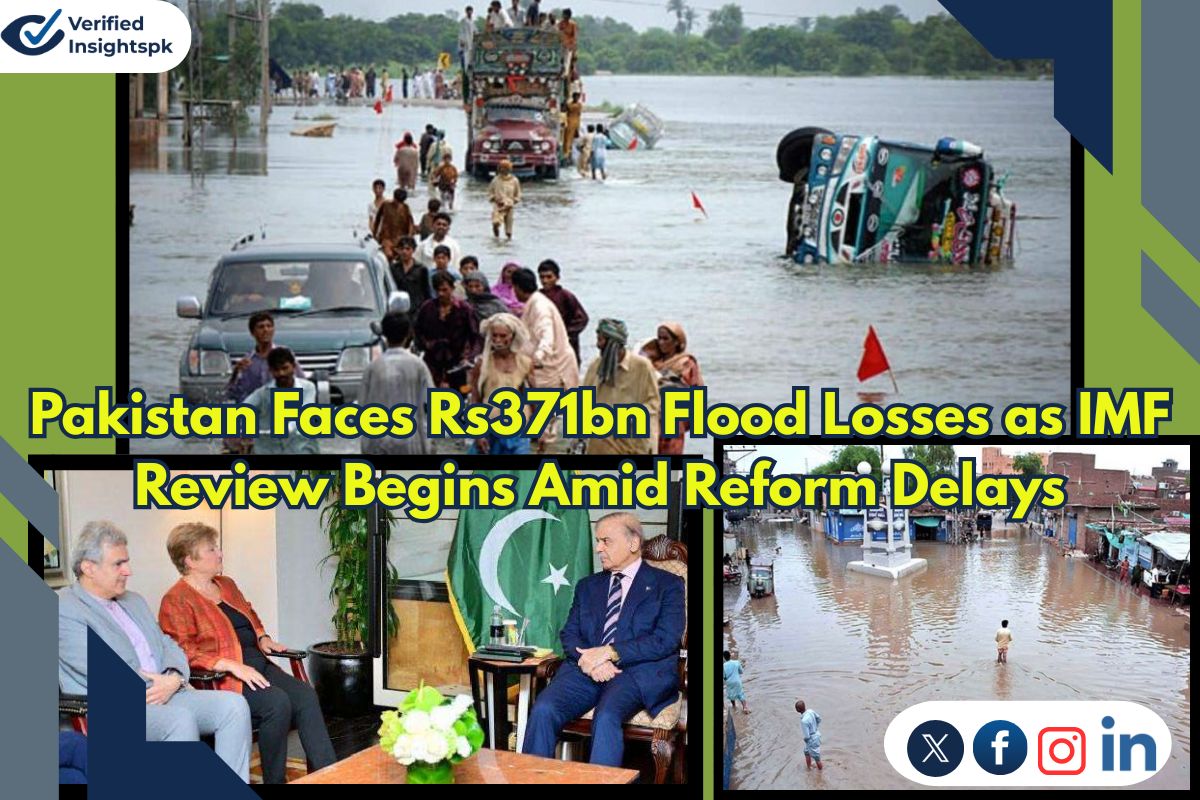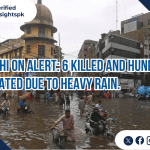
Pakistan Faces Rs371bn Flood Losses as IMF Review Begins Amid Reform Delays
Islamabad, October 1, 2025
Pakistan has informed the International Monetary Fund (IMF) that the country incurred economic losses of Rs371 billion due to the recent floods. The disaster has forced the government to cut its GDP growth target for 2025-26 from 4.2% to 3.9%.
At the same time, an IMF mission led by Iva Petrova has started its review meetings in Islamabad. The talks will cover the $7 billion Extended Fund Facility (EFF) and the $1.1 billion Resilience and Sustainability Facility (RSF).
Revenue Gaps and Reform Delays
Finance Minister Muhammad Aurangzeb and his team admitted that Pakistan’s performance was mixed. Although the power sector benchmarks were met, the government fell short of its revenue targets.
By the end of June 2025, the Federal Board of Revenue (FBR) had missed collections by around Rs1.2 trillion — nearly 1% of the country’s GDP. The first two months of the current fiscal year have also shown similar gaps.
Officials are now negotiating corrective measures with the IMF to stay on track for the following biannual targets.
Flood Damages to the Economy
The floods caused widespread destruction:
- 1,006 deaths and over 1,063 injuries
- 12,569 houses damaged
- 2,133 km of roads and 248 bridges destroyed
- 1,098 schools and 128 health facilities hit
- 3.26 million acres of crops lost
- Over 10,000 livestock killed.
Province-wise, Khyber Pakhtunkhwa (KPK) saw the highest death toll, while Balochistan recorded the worst housing damage.
Major crops, including cotton, wheat, sugarcane, and maize, suffered significant losses. Cotton production is expected to fall by up to 2 million bales, while wheat losses may reach 1.3 million tons. Overall, the agriculture sector is likely to shrink from 4.5% growth to 4%.
The industrial sector may also slow down slightly, from 4.3% to 4.2%, while the services sector is expected to fall from 4% to 3.7%.
External Financing and Bonds
Pakistan has informed the IMF that it requires $26 billion in external financing this year. About $12 billion is expected to be rolled over, with firm commitments from China.
The government also plans to re-enter the international bond market. A Panda bond of $250–300 million is expected in November 2025, followed by another in April 2026. A Eurobond may be launched in the last quarter of FY26, depending on interest rates in the US and Pakistan’s credit rating.
Meanwhile, Pakistan has already repaid $500 million of a Eurobond on September 30 and must pay another $1 billion by April 2026.
Policy Challenges
Discussions with the IMF also encompass the delayed petroleum refinery policy, which is worth nearly $6 billion in new investment. Refineries argue that tax exemptions are needed for equipment and supplies. Without them, they face serious cash flow problems.
The IMF, however, is against granting new exemptions under the programme. This has stalled refinery upgrades, which could have helped Pakistan produce cleaner fuels and reduce harmful emissions.
The government has also faced criticism for using Rs130 billion from the natural disaster fund to pay banks for remittance incentives. Officials now need to justify this spending while also requesting flexibility from the IMF in budget targets to create space for flood-related expenses.
Governance and Structural Issues
Several IMF-linked reforms remain incomplete:
- The governance and corruption diagnostic report is still unpublished
- SOE governance law not finalised
- Agricultural income tax laws were passed, but implementation is unclear
Despite these delays, Pakistan has met most quantitative performance criteria for June 2025.
What’s Next?
If the current review is successful, Pakistan is expected to receive approximately $1 billion from the IMF by the end of October 2025. However, to secure future disbursements, the government must show progress on revenue collection, reforms, and governance.
The floods have already reshaped Pakistan’s economic outlook. With billions in damages, slower GDP growth, and weak revenues, the government faces a delicate balancing act: rebuilding after the disaster while also adhering to IMF commitments.










